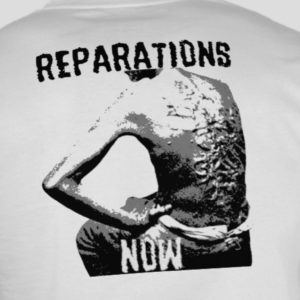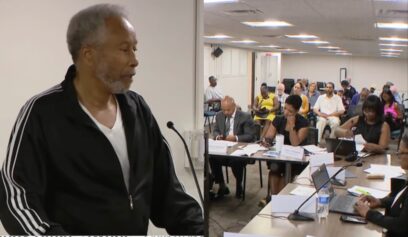Let us not endeavor to pursue justice on the cheap.
Now that the issues of racial inequality, institutional racism and systemic discrimination are beginning to seep into the conscience of the nation, why don’t we take this a step further and have a discussion about reparations? To be sure, the current climate has proven more amenable to a closer look at the problems facing the Black community. However, reparations is one of those issues remaining beyond the scope of white liberal discourse, perhaps even regarded as taboo, or at the least dismissed as unrealistic or undesirable. Why is it like that, pray tell?
This is a presidential election year, and no better time to broach the matter. Bernie Sanders — the democratic socialist senator from Vermont who is running for president on the Democrat side — says he is against reparations, as Ta-Nehisi Coates made note recently in The Atlantic.
“Its likelihood of getting through Congress is nil,” Sanders told Fusion in an interview before the Iowa Brown & Black Forum. “Second of all, I think it would be very divisive.”
Moreover, Sanders, who called for a national apology for slavery and has promoted a racial justice policy, called instead for “massive investments in rebuilding our cities,” including millions of good-paying jobs and free tuition for public college.
Meanwhile, at the Brown & Black Forum, former Secretary of State Hillary Clinton did not directly answer the question of whether reparations should be studied.
“I think we should start studying what investments we need to make in communities to help individuals and families and communities move forward,” she said. “And I am absolutely committed to that.”
The policy solutions prescribed by these candidates, according to Coates, “address black people not so much as a class specifically injured by white supremacy, but rather, as a group which magically suffers from disproportionate poverty.”
Further, he calls reparations “the indispensable tool against white supremacy,” as one cannot claim to fight white supremacy after robbing a people, incurring a debt and suggesting you never pay them back. And while policies such as raising the minimum wage and making college tuition free are laudable, they do not get to the heart of the white supremacy that built this nation and its institutions and that continues to haunt and chase Black people — making it hard for us to get a mortgage and leaving Black college graduates with the same employment prospects as white high school dropouts fresh out of prison.
The fact remains that 150 years after the ratification of the Thirteenth Amendment, slavery is still upon us, as the badge of that evil and brutal institution still remains. Apologies for slavery are a good first step. Last week, the Delaware House of Representatives passed a resolution apologizing for the state’s role in slavery, as The News Journal reported. The resolution, passed overwhelmingly, “acknowledges the fundamental injustice, cruelty, brutality, and inhumanity of slavery and Jim Crow,” and “apologizes, on behalf of the people of Delaware, for the State’s role in slavery and the wrongs committed against African-Americans and their ancestors who suffered under slavery and Jim Crow.”
The symbolic resolution also “recognizes the need to address and educate Delawareans about the social stigma, stereotyping, bias and discrimination which still exist in the state today as vestiges of the institution of slavery,” and “expresses its commitment to rectify the lingering consequences of the misdeeds committed against African-Americans under slavery and Jim Crow and to stop the occurrence of human rights violations in the future.”
Symbolism has its place, but there is a next step. After all, when damage is done there must be repair. The unspeakable physical, cognitive and spiritual damage inflicted upon the predominantly Black children of Flint, Michigan is a clear example of how the badge of slavery operates. Such a thing would not happen to a city of white children. And that same badge of slavery would undoubtedly funnel these children into a prison pipeline, forcing them to spend their formative years behind bars for something as simple as drug possession, while white supremacy will allow the crime of poisoning a city of Black children to go unpunished.
Writing in his new book, America’s Original Sin: Racism, White Privilege, and the Bridge to a New America, Jim Wallis says that white people must confront white privilege as sin. Invoking the Black liberation theologian and seminarian James Cone, Wallis says that white Christians and their churches must repent from the “great sin” of white racism, adding that the key to redeeming this tragedy lies in repentance and reparation. As Cone noted — comparing racism to a lynching of Black people, in the way Jesus was crucified — for white folks to join the effort of racial justice, they must “die to whiteness” and “be reborn.” As Wallis argues, repentance means more than just saying you’re sorry. It means a change of mind, heart and behavior, a “costly grace” rather than the “cheap grace” of forgiveness without repentance.
This, it appears, would require far more than a mere policy change.



